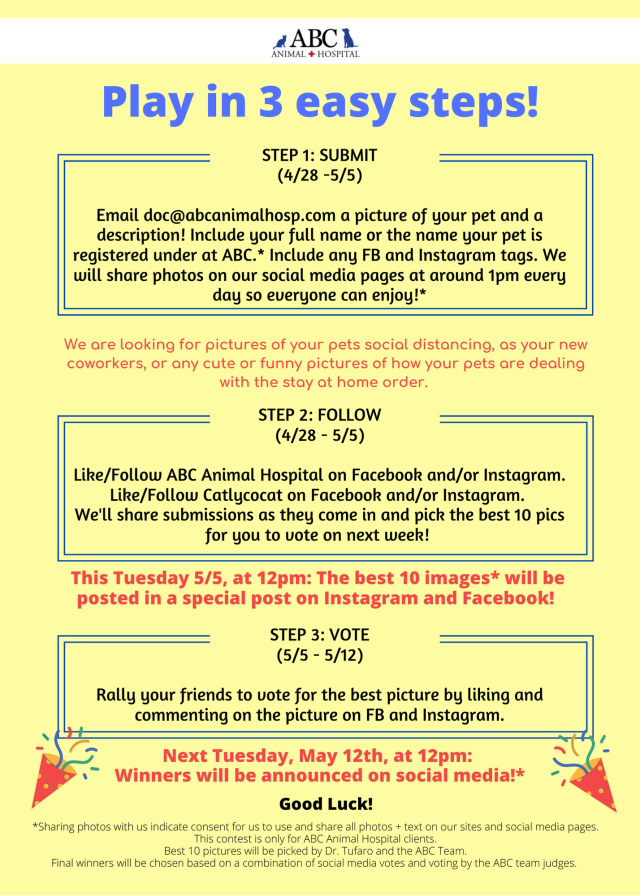





Can you guess the top 5 reasons a dog may need to go to the vet? Here are the top 5 thing we see at ABC Animal Hospital.
We’re sharing this simple list as each of problems benefit greatly from early treatment. It’s totally true that prevention is the best medicine, and early detection is the next best thing! We see these ailments in big dogs, small dogs, dogs of all breeds, foster dogs, purebreds, – no dogs are free of these issues – no matter how amazing and special each and every one of them may be!
As much as we love to see your pets, we prefer to see patients for checkups and preventative care. We’re sure your pets would love to tell you what problems they have but because they don’t speak ‘human’ it’s up to us and you to be able to read the signs that something may be wrong with your pet.
Based on data from VPI Pet Insurance here are the top 5 reasons that dogs visit the vet, and also the top 5 things we see at ABC Animal Hospital.
Allergies can cause skin to become itchy and dry or greasy accompanied by frequent scratching or licking. Your dog may become moody or irritable due to the discomfort and constant itching. There are typically 3 main causes for allergies: foods, seasonal or environmental allergens such as pollen or insects etc, and grooming or cleaning products. Your veterinarian can prescribe medication to relieve the itching and work with you to figure out the underlying allergen through a consult and advice on how to rule out allergens one by one.
Certain dogs can be prone to ear infections – especially dogs with floppy or hairy ears. Allergies, excessive wax, or trapped water can also cause ear infections. Ears develop a strong smell and the skin inside becomes tender and red. Regular and proper cleaning and grooming excessive hair can help prevent infections. This can be very uncomfortable for your dog and severe infections must be treated with antibiotics and a deep ear cleaning administered by a veterinarian.
Skin tumors are very common in dogs – thankfully many of them are benign. They can be caused by things ranging from fatty build ups under the skin (lipoma) to cancers. Identification of lumps typically require an aspirate or biopsy and examination by a trained veterinarian. Some benign masses should be removed incase the become malignant, many can be left alone. Be on the lookout for suspicious bumps or sores and have them evaluated – especially if they are new, discolored, oozing, or growing rapidly.
Skin is an indication of overall health and it’s very common for various medical issues to crop up in the form of a skin infection. Parasites, allergies, stress, or metabolic issues can cause excessive scratching, licking, or chewing. Constant skin damage can lead to bacterial or yeast infections. Your veterinarian can help figure out the underlying causes of the infection and prescribe the appropriate antibiotics and medications. For healthy skin it’s important to use high quality hypoallergenic shampoos for dogs. ABC Animal Hospital has developed a pet shampoo that contains all natural ingredients ( stop by for a free sample!). Feeding your dogs a healthy and balanced diet, regular brushing, and parasite prevention programs can also help keep your pet skin problem free.
Arthritis is a degenerative condition that affects the joints. It affects one in 5 dogs during their lifetime and unfortunately, we see it in dogs of all ages. Early stages of arthritis can be hard to notice as dogs don’t always show outwards signs of pain. A change in attitude or alertness especially during the morning (such as being reluctant to jump on the couch) , weight gain, or a decreased interest in playing are early indicators of joint discomfort. Treatments include weight control and physical therapy as well as veterinarian prescribed medications to relieve pain and inflammation, repair joint cartilage, and prevent further damage.
We hope that this list can give you an idea of the red flags to keep an eye out for. If you have questions or concerns about your pets health ( listen to your gut feeling) you should call your veterinarian or us, and we’ll do our best to help you address the issue.
If you need help there are a few ways you can contact us:
Call us at (212) 358 0785 ( we’re open 7 days a week)
Email us at doc@abcanimalhosp.com to have someone call you back
New clients can also register your pets directly on our website. You can also ask us a question about your pets through our website’s Ask the veterinarian page.
This is our first post in our ASK ABC series – addressing real questions we get from our clients.
1. What is a heartworm?
Heartworms are worms that live in the heart, lungs, and blood vessels of infected pets. They can cause heart disease, lung failure, and damage other organs in the body.
2. How can my pet get heartworms?
 Mosquitoes are carriers of heartworms and can transmit it to your cats or dogs. They can live for several years in your pet, and cause long lasting damage even after the worms are removed.
Mosquitoes are carriers of heartworms and can transmit it to your cats or dogs. They can live for several years in your pet, and cause long lasting damage even after the worms are removed.
3. How at risk is my pet from getting heartworms?
This depends on where you live and where travel with your pets. To see data on heartworms and other parasites in your area you can use parasitesandpets interactive map. New York’s map is shown below.
Risks of heartworm infection are higher than usual during mosquito season. This usually begins in Spring, from April until November. Heartworm protection is especially important for pets who travel to places with mosquitoes (wooded, gassy areas, upstate etc), or to states where there are higher risks for heartworm.

Screenshot from Parasitesandpets.com – interactive map for Heartworm data in New York County. As you can see: New York county has a low risk ( 1/125 cases), but there are counties close by that have a moderate risk.
4. How can I protect my pets from heartworms?
Early detection and prevention is key to protecting your pets. At ABC Animal Hospital one recommendation we give after examining a pet is an oral medication to prevent heartworm disease. We trust and sell Iverhart – a chewable medication. (We keep our prices competitive to make it available for all our clients). We provide quick and easy heartworm tests for your pets in-house so results can be provided almost immediately.
You can contact us at (212) 358 0785 to make an appointment for an exam and a heartworm test.
New clients can also register your pets directly on our website. If you have any medical related questions – you can ask us for free through our website’s Ask the veterinarian page.
We hope that this helped clear things up about what heartworms are, and how you can protect your pets. Let us know in the comments if there are any other questions we can answer, and please share this if you found it helpful.
*Disclaimer: This blog is meant only to offer general advice to pet owners. it cannot replace advice given to you by a veterinarian. Reading our blog does not establish a client-patient relationship between you and ABC Animal Hospital. If you suspect that your pet is sick, contact a veterinarian you trust for a proper examination. We can be reached at 212 358 0785.
This is a great toy – with bonus points for using a recycled bottle. Pets need to be physically active and also mentally stimulated as boredom and excess energy can lead to behavioral problems. Plus – it just looks like a really fun game!
This is a simple video on how you can safely and quickly trim your dogs nail, while avoiding the quick.
Your dog should get used to having his/her nails handled from a young age making it easy to trim the nail regularly. Long nails can get snagged or splinter and cause injury to your dog.
I love how the dog in the video is like a little diva while the owner trims and files his nails!